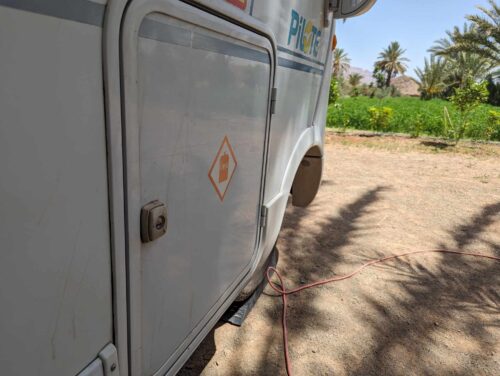In this post, I discuss our experience of taking our pet dog with us to Morocco. The problems we encountered, the paperwork required, what is required to return to the EU, and how the process works.
Introduction
We travelled to Morocco using the ferry from Algeciras to Tanger Med on the 17th November 2023. We thought we had done everything we could to ensure we had all that was required by the authorities in both Spain and Morocco.
Our dog, Zeus, originally had a passport issued in Cyprus. However, because a UK vet wrote in it, albeit some time ago, with details of a rabies vaccination, we had it replaced with one issued in Spain a couple of years ago. His rabies vaccinations are up to date, performed by an EU vet and written in the passport. He is microchipped. His flea and worm treatments are up to date.
The only thing we didn’t have was a rabies antibody titre test, so we had one done in the UK by an approved vet. In order to ensure the best possible results the vet recommended having a rabies booster first, then after 30 days drawing the blood for the titre test. So that is what we did. With our knowledge now we know this is only required after a first vaccine not after a booster.
The sample was sent to an EU approved laboratory in the UK, and the results came back satisfactory. Armed with all this we went to see a vet in Tarifa, close to the ports and experienced in dealing with taking pets abroad. That is where thing went a bit south.
EU rule changes
Unbeknownst to us, and the vets in the UK, the requirements for returning to the EU from a high-risk country such as Morocco have recently changed.
It is now a requirement that the titre test is performed by an EU vet, tested in an EU laboratory, and written in the passport by said EU vet. The rules changed in the time between us getting the test done in the UK and us going to the vet in Spain.
That meant that in order for us to get back into the EU on our return from Morocco we needed to have another titre test done by the Spanish Vets. Another expense and a two-week delay while we waited for the results – it’s 10 working days for the sample to be processed, although the results are often available a bit earlier.
It’s worth noting that although the results may be available earlier than 10 working days by the vets, and they can write them into the passport before the paper certificate is received, the port vets may require sight of the actual paperwork when returning from Morocco.
We decided to take a risk and set sail before we had the actual certificate because we had encountered so many delays already – we were already about 2 months later going into Morocco than we thought we would be.
In practice, what this means is that should the port vets require sight of the paperwork one of us will have to clear customs, travel to Tarifa to collect the certificate, and then return to the port with it. A calculated risk because the port vets know the vets we used in Tarifa and trust their work, but if we do have to pick it up it’s only a short drive anyway.
Morrocan Entry Requirements
Requirements for returning to the EU
The fun starts when you want to return to the EU from a high-risk country such as Morocco.
Your pet must:
- be microchipped (and registered to you)
- have an EU pet passport
- have an up-to-date rabies vaccination, administered and written into the passport by an EU vet
- have a valid rabies antibody titre test, performed by an EU vet and tested in an EU lab, with the results written into the passport by the EU vet who took the sample.
The rabies antibody titre test will last for life AS LONG AS the rabies vaccinations are kept up to date by an EU vet. If a vaccination becomes overdue, even by just one day, then the titre test will have to be repeated.
Rabies vaccinations performed in the UK are no longer recognised by the EU. If your pet hasn’t received a vaccination by an EU vet previously, then you will need to get one done in the EU, and potentially wait 30 days before a rabies antibody titre test can be performed.
Summary of the process
- an Animal Export Certificate, issued by an official animal health centre
- to obtain the required Animal Export Certificate it is necessary to get an Official Health Certificate, obtained from a local veterinary clinic just before travelling
To return to the EU from a high-risk country such as Morocco your pet must:
- be microchipped (and registered to you)
- have an EU pet passport
- have an up-to-date rabies vaccination, performed and written into the passport by an EU vet
- have a valid rabies antibody titre test, performed by an EU vet and tested in an EU lab, with the results written into the passport by the EU vet who took the sample.
I hope our experience helps in understanding the requirements for travelling to countries outside the EU with a pet. This is a summary of our recent experiences of travelling to Morocco with Zeus, however, you should check the specific entry requirements for any country you wish to take your pet to.
Happy Travels.
Hope You Enjoy!
Please leave us a comment!








